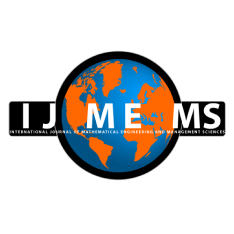Muhammad Faisal
Department of Informatics, Universitas Muhammadiyah Makassar, Makassar, Indonesia.
Ery Muchyar Hasiri
Department of Informatics Engineering, Universitas Dayanu Ikhsanuddin, Bau-Bau, Indonesia.
. Darniati
Department of Informatics, Universitas Muhammadiyah Makassar, Makassar, Indonesia.
Billy Eden William Asrul
Department of Informatics Engineering, Universitas Handayani Makassar, Makassar, Indonesia.
Hamdan Gani
Department of Machinery Automation System, ATI Makassar Polytechnic, Makassar, Indonesia.
Sri Wahyuni
Department of Information Technology, Universitas Islam Negeri Alauddin, Gowa, Indonesia.
Nurul Aini
Department of Information Systems, Universitas Dipa Makassar, Makassar, Indonesia.
Respaty Namruddin
Department of Informatics Engineering, Universitas Handayani Makassar, Makassar, Indonesia.
Faisal Akib
Department of Information Technology, Universitas Islam Negeri Alauddin, Gowa, Indonesia.
DOI https://doi.org/10.33889/IJMEMS.2025.10.6.101
Abstract
The global urgency to combat climate change has led to the widespread adoption of carbon emission trading schemes as market-based instruments. This study introduces a scalable and interpretable machine learning-based framework for evaluating, clustering, and predicting city-level carbon trading strategies. This study fills a gap in localized policy evaluation by combining economic, social, environmental, and political factors to make carbon regulation more adaptive and based on evidence. The hybrid framework that was suggested combines Multi-Objective Optimization (MOO), Multi-Criteria Decision Making (MCDM), Particle Swarm Optimization—Self-Organizing Maps (PSOM), and Random Forest classification. Criteria are weighted using a combination of Fuzzy Delphi Method (FDM) and Stepwise Weight Assessment Ratio Analysis (SWARA), with prioritization executed via MABAC. Cities are clustered through PSOM based on weighted indicators, and policy predictions are generated using Random Forest trained on these clusters. The framework effectively demonstrated regional differences and putting cities into separate policy groups based on their social, economic, environmental, and institutional characteristics. It also demonstrated strong predictive accuracy in recommending feasible carbon trading strategies using the Random Forest classifier. Combining fuzzy logic and machine learning made it possible to deal with the unpredictability and non-linearity that are common in city-level statistics. This study introduces a new and adaptable decision support system based on machine learning that improves the accuracy and responsiveness of evaluations in the carbon market. The integrated methodology furnishes policymakers with an all-encompassing instrument to evaluate and project localized strategies, thereby promoting more equitable and effective carbon governance across heterogeneous urban environments.
Keywords- Carbon trading, Multi-objective optimization (MOO), Multi-criteria decision making (MCDM), Particle swarm optimization – Self-organizing maps (PSOM), Machine learning.
Citation
Faisal, M., Hasiri, E. M. Darniati, .., Asrul, B. E. W. Gani, H., Wahyuni, S., Aini, N., Namruddin, R., & Akib, F. (2025). A Machine Learning-Driven Framework for Evaluating and Clustering City-Level Carbon Trading Strategies. International Journal of Mathematical, Engineering and Management Sciences, 10(6), 2171-2200. https://doi.org/10.33889/IJMEMS.2025.10.6.101.



